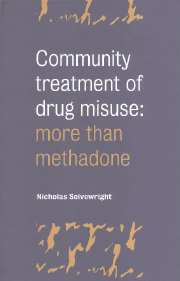Book contents
- Frontmatter
- Contents
- Foreword by Professor John Strang
- Preface and acknowledgements
- Introduction: community treatment in context
- Part I Treatments
- Part II Providing clinical services
- Epilogue Future directions
- Appendix 1 Protocols for quick detoxification from heroin
- Appendix 2 Opioid equivalent dosages
- Glossary
- References
- Index
Introduction: community treatment in context
Published online by Cambridge University Press: 17 August 2009
- Frontmatter
- Contents
- Foreword by Professor John Strang
- Preface and acknowledgements
- Introduction: community treatment in context
- Part I Treatments
- Part II Providing clinical services
- Epilogue Future directions
- Appendix 1 Protocols for quick detoxification from heroin
- Appendix 2 Opioid equivalent dosages
- Glossary
- References
- Index
Summary
In providing clinical treatment for drug misuse we play one part in addressing a problem which is among the most serious facing modern society. The use of illicit drugs has escalated hugely in recent years in many countries across the world, with wider causes which are beyond our control as, indeed, are any overall solutions. Most of the trends which have led to such high rates of drug misuse show no signs of abating, and political arguments rage as to the relative merits of differing social policies and approaches to drug legislation. Within this, as clinicians we have a specific prime responsibility to treat individuals who present with identifiable drug problems, plus an additional implicit role in helping those affected by such use, and we must be able to fulfil these as successfully as possible, as part of the much bigger picture. This requires an informed knowledge of all the approaches which can best help individuals to stop taking drugs or to reduce their usage in their various personal situations, and can limit the associated problems in homes, families, and communities.
This book aims to help in that task by reviewing practically the treatments which are indicated across a broad range of clinical situations. In recent times the treatment scene internationally has been dominated by methadone, the so-called ‘heroin substitute’ which can enable users to avoid the various consequences of taking illicit drugs.
- Type
- Chapter
- Information
- Community Treatment of Drug MisuseMore than Methadone, pp. 1 - 14Publisher: Cambridge University PressPrint publication year: 1999



